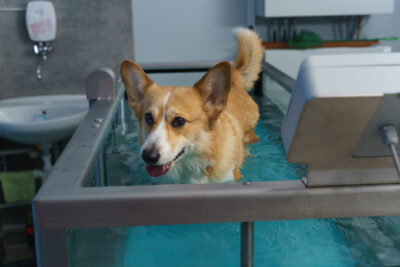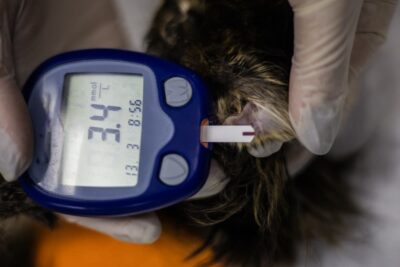Melatonin for Dogs: Can They Have It?

Chances are, melatonin brings to mind the sleepytime gummies we often take when a good night’s sleep just won’t come. The hormone melatonin is manufactured in labs and formulated into supplements to promote quality z’s, and it’s one of the most popular supplements for adults and kids alike, according to a 2012 survey by the National Institutes of Health.
But if you’ve got a stressed-out pup keeping you up at night, you might be asking yourself: Is melatonin for dogs safe and can it help?
Before you mix a gummy into your pup’s food (hint: don’t do that!), learn everything you need to know about melatonin for dogs, including potential health benefits, side effects or risks to consider, and the proper melatonin dosage for dogs.
What is Melatonin?

“Melatonin is a naturally-occurring hormone that both humans and their dogs produce,” says Dr. Trina Hazzah, an Los Angeles-based veterinarian specializing in oncology and complementary and alternative medicine.
The pineal gland, a small, cone-shaped structure in the center of the brain, releases melatonin when darkness falls. In turn, melatonin helps regulate your body clock and sleep schedule [1].
People generally take melatonin supplements for their potential sleep-promoting effects. Research shows increasing your melatonin intake may help you fall asleep faster, stay asleep longer, improve overall sleep quality, and support recovery from jet lag, per the Mayo Clinic. Another pro: Unlike many sleep medications, melatonin is unlikely to cause dependency or side effects (though a headache, dizziness, nausea, or drowsiness are possible).
Similarly, many pet parents are interested in melatonin as a natural sleep aid or sedative for their pets.
Can You Give Dogs Melatonin?
If you’ve got a restless pup who just can’t settle down, it’s understandable if you’ve Googled the phrase: is melatonin safe for dogs?
The good news is, melatonin is generally considered safe for dogs at the right dosage, says Dr. Huzzah. Since the correct melatonin dosage for dogs can vary quite a bit, it’s best to talk to your veterinarian before giving it to your pet (more on that later!).
As far as what melatonin can do for your little one, there are quite a few ways giving dogs melatonin can be good for them.
Benefits of Melatonin for Dogs
While few scientific studies have dug into the benefits of giving dogs melatonin, many pet parents have found that the supplement can be used as an effective sleep aid for dogs. Melatonin supplements also show promise in easing symptoms of anxiety, sleep cycle disorders, adrenal disease, and some forms of hair loss.
Here are a few potential health benefits of melatonin for dogs:
- Ease anxiety. Beyond the distress separation anxiety causes your dog (and you!), it can also lead to behavioral problems like barking, major destruction, or accidents while you’re gone, says Dr. Huzzah. A melatonin supplement may help your dog chill out when you’re away for a long work day or vacation. And as a natural sedative for dogs, it might also help dial down anxiety from common triggers like noise phobias such as thunderstorms or fireworks or stress over a road trip or visit to the veterinarian or groomer.
- Alleviate insomnia and other sleep disorders. “Dogs who suffer from insomnia often have cognitive dysfunctions which can disrupt their natural biorhythms and lead to unusual sleeping schedules,” says Dr. Huzzah. In this case, melatonin may help get your dog’s sleep schedule back on track so you can both get some much-needed rest.
- Relieve symptoms of Cushing’s disease. This adrenal disease can give dogs excessive hunger and thirst, resulting in many bathroom breaks throughout the day, among other distressing symptoms. In mild cases of Cushing’s disease, melatonin can help ease symptoms, potentially by blocking the uptake of excess cortisol (a hormone dogs with Cushing’s disease produce too much of), explains Dr. Huzzah.
- Improve coat condition after hair loss. For dogs with seasonal hair loss or alopecia, some studies show melatonin can help improve their coat condition. So far, it’s unknown why exactly this may be [2].
- Reduce complications of cataract surgery. One 2016 study found that melatonin may be a useful tool for reducing postoperative complications of cataract surgery in dogs [3].
Shopping for supplements—even for pups—can be overwhelming. Here’s what to look for in a melatonin supplement for dogs.
How to Give Melatonin to Dogs

“Melatonin typically comes in tablet, capsule, powder, and liquid forms that can be given with or without food,” says Dr. Huzzah. If you’ve got a picky eater on your hands, don’t worry. Today, you can find melatonin in a slew of doggy products, including tasty treats and supplement bars.
In most cases, you can expect melatonin to begin working within 10 to 15 minutes after your dog takes it, and its effects can last for up to eight hours, notes Dr. Huzzah. In light of this, it’s a good idea to give your pup melatonin shortly before they’re exposed to a stressful situation or as soon as you notice their anxiety is acting up.
Melatonin Dosage for Dogs
As is true for many supplements and medications, the exact dosage of melatonin that will work best for your dog depends on many factors including their age, weight, and the health condition your dog may be experiencing, says Dr. Huzzah.
When buying melatonin-infused supplements for your dog, make sure to pay close attention to the dosing instructions on the packaging and speak with your veterinarian to determine the correct dosage for your dog’s individual needs.
Melatonin Side Effects for Dogs

Because studies of melatonin use in dogs are limited, little is known about potential side effects. While uncommon, sometimes dogs experience lethargy, an upset stomach, weight gain, or more rarely, an increase in heart rate, says Dr. Huzzah.
If you suspect your dog is having an allergic reaction after taking melatonin, contact your veterinarian immediately.
Otherwise, keep in mind that some melatonin products contain xylitol, which can be very toxic for dogs. For this reason, stick with trustworthy manufacturers and products that get the thumbs-up from your veterinarian.
Like other supplements and medications, melatonin can potentially interact with other herbal therapies and drugs. Again, check in with your veterinarian for help.
Melatonin for Dog Anxiety
As pet parents, many of us find ourselves asking, What can I give my dog for anxiety? If your dog follows you everywhere due to mega separation anxiety or just tends to be nervous in general, neither of you should have to suffer any longer.
Ask your veterinarian what melatonin can do for your dog, and with their okay, consider treating your pup to a delicious and soothing supplement containing melatonin to promote calming for both you and your pet.









